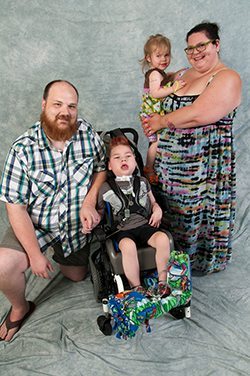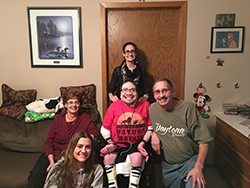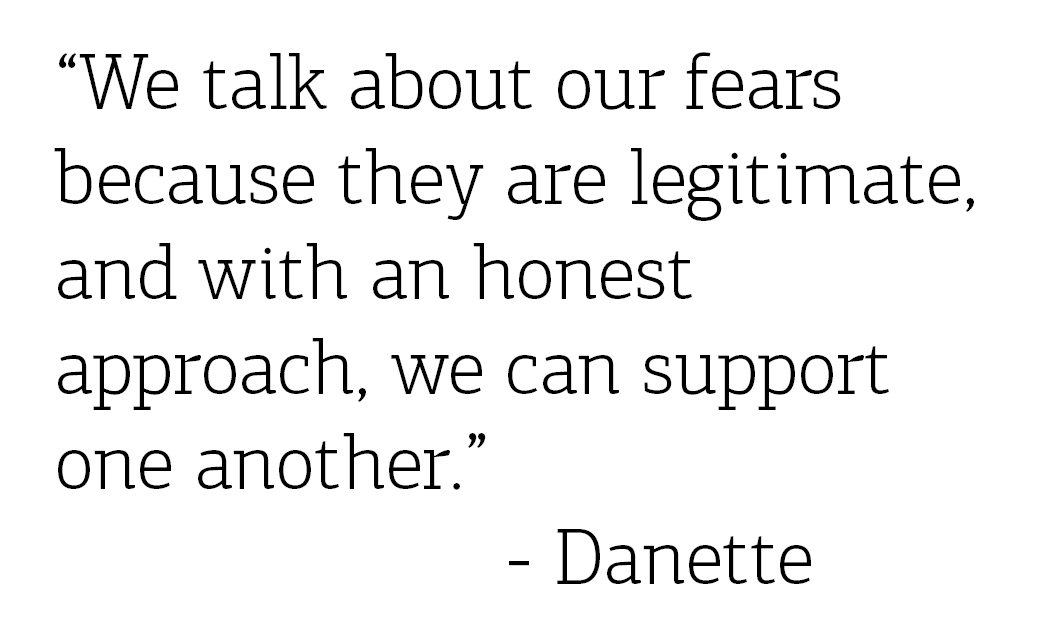Marriages Feel The Impact When Raising a Medically Complex Child

Seasoned vets and newlyweds alike can tell you – maintaining a strong marriage takes work. Regardless of outside influences or personal circumstances, both partners need to dedicate time, energy and a willingness to communicate to stay on the same page. While this isn’t even always easy in the best of times, the effort is well worth it.
 Perhaps one of the biggest changes in a married couple’s relationship comes when a child enters the picture, bringing an abundance of love along with new challenges. But how does that change when the child has medical complexities? We were curious to learn how marriages are affected by children who come home with extensive medical needs, and found ourselves coming up empty handed when we went in search of resources. So we talked to the people who know its impact firsthand – the parents of these kiddos.
Perhaps one of the biggest changes in a married couple’s relationship comes when a child enters the picture, bringing an abundance of love along with new challenges. But how does that change when the child has medical complexities? We were curious to learn how marriages are affected by children who come home with extensive medical needs, and found ourselves coming up empty handed when we went in search of resources. So we talked to the people who know its impact firsthand – the parents of these kiddos.
In this first post of a monthly three-part series, parents give us insights into how having a medically complex child impacted their relationship, how they have been affected differently, and the financial concerns they’ve felt. Check back here for links to the other two posts once they’re available, or subscribe to have the blog posts delivered right to you!
Adjusting to unexpected stresses
Parents of children with complex medical needs regularly experience constant doctor’s appointments and clinic visits, unexpected periods of time in the hospital, and the anxiety of waiting for answers or results while managing their child’s health. This load that has an expected impact on the level of stress they experience.
“I always say that in a marriage involving a medically complex child, being married to the right person is really hard and being married to the wrong person is impossible,” says Emily who is mother to 5 year old Lizzie, who has complex needs. “The life we have with her is life and death situations – it can happen daily, and often happen weekly. So you have to really communicate and have to respect the way your partner processes the whole thing.”
 Hospitalizations are a big stressor not only financially and emotionally, but as parents try to juggle the care for their medical child with that of their other children. Families are often separated into two locations, and parents taking the time to connect quickly falls down on the list.
Hospitalizations are a big stressor not only financially and emotionally, but as parents try to juggle the care for their medical child with that of their other children. Families are often separated into two locations, and parents taking the time to connect quickly falls down on the list.
“It’s hard to maintain communication with each other about what’s going on if I’m in the hospital for 3 weeks with my youngest. It’s quick hi’s and bye’s between the two of us,” says Laurie, who has two daughters, one of who has complex medical needs.
Nicole, who is mother to a medically complex 5 year old, has learned to understand the waves that come with caring for a medically complex child while maintaining a strong marriage.
“There will be times that you just co-exist with your spouse, and you just have to know that sometimes that’s okay. As long as you’re trudging forward and handle things that need to get done, and the other person knows you love them – you’ll find the time to make your marriage a priority again. But you really have to be conscious of making it a focus once the storm has settled a bit.”
Finding strength in one another
Another common sentiment heard from a number of parents revolves around them finding strength in one another during these trying times. These trying circumstances built a stronger bond and a deeper trust for one another, and they worked toward a common goal of helping their child thrive.
Kari, whose son Jacob has complex medical needs, knows that her and her husband Kirk support each other unconditionally and fight together to give him the best care possible – even on the ‘off’ days.
“We have shown each other love and support in the most difficult times. We’ve sat together at a table and held hands while making decisions about brain surgery, taken classes together on trach care and CPR, we have listened to awful test results. All together, always,” says Kari. “This has built strength in our marriage over time that we wouldn’t have if we hadn’t experienced and overcome those things together.”
Gabriella, whose daughter was born 16 weeks prematurely, reflected a similar sentiment as she describe the newfound level of trust her and her husband built following their daughter’s birth via C-section.
“Having our daughter and becoming NICU parents is by far the hardest thing we’ve ever had happen to us individually and as a couple,” says Gabriella. “But we loved each other so fiercely and held onto our commitment to being each other’s life partner, through thick and thin.”
A change in the social scene
Most parents – whether their child has medical needs or not – can relate to a shift in their social life once a baby comes along. But for the parent of a medically complex child, this can be even more drastic due to an increased concern of illness, the child’s amount of equipment, or an extensive care routine. What once may have been an important part of a couple’s life is now significantly reduced, and sometimes seems to have gone away altogether.
 “It can feel isolating and lonely,” says Laurie. “We’re not like our friends whose kids are independent and can travel and go do different things. We don’t have that flexibility. With such complex cares, we can’t get away and have time to focus on our relationship while also making sure our daughter’s needs are met.”
“It can feel isolating and lonely,” says Laurie. “We’re not like our friends whose kids are independent and can travel and go do different things. We don’t have that flexibility. With such complex cares, we can’t get away and have time to focus on our relationship while also making sure our daughter’s needs are met.”
Gabriella and her husband make an effort to give each other the chance to have some free time that allows them to do what they enjoy. Whether that’s taking turns going to the gym or meeting with friends, and in the summer taking advantage of being able to meet friends at the park when cold and flu season has passed.
“By trying to be respectful of each other’s “me” times, we’re able to be better parents and partners for each other,” says Gabriella. “For me, these things are sacred to my sanity. They give me joy and pleasure, and allow me to express myself outside of being a mom and a wife.”
Unexpected financial burden
Financial concerns are known to be one of the most stressful topics in any marriage – and in one with a medically complex child, that strain can multiply. Whether due to expenses related to equipment and hospitalizations, or a change in income when one parent stays home with the child, it can be a big change that takes time – and serious adjustments – to accept.
Gabriella and her husband see the financial sacrifices they’ve had to make as a couple as necessary for the health of their daughter, including their unexpected decision for her to be a stay at home mom. This decision is one that many parents recognized as without a doubt their best decision but a scary one, nonetheless.
“I know that in the long term, this is best for him,” adds Katie, who stays home to care for her son. “He’s really thrived since I became his full-time caregiver in our house, so the financial burden and stress is worth it to me.”
 While insurance plans help cover expenses of care, working overtime and significant adjustments in lifestyle are sacrifices many families make to help ends meet – decisions that can hinder a couple’s plans for their future and affect a marriage. Parents also face stressful decisions like needing to prioritize aspects of their child’s medical care based on cost and resources available.
While insurance plans help cover expenses of care, working overtime and significant adjustments in lifestyle are sacrifices many families make to help ends meet – decisions that can hinder a couple’s plans for their future and affect a marriage. Parents also face stressful decisions like needing to prioritize aspects of their child’s medical care based on cost and resources available.
“Even though many items are covered by insurance and waivers, there are expenses that still need to be paid,” acknowledges Kari. “We are constantly catching up and going through waves of financial burden. Hospital stays are the worst, because I can’t claim hours (as a caregiver) with Jacob, and Kirk often misses work. Everything stops. It’s very unnerving to pause, financially and in every other way, and then catch up.”
As Nicole mentioned, money is often going to be hard in a marriage no matter what the hardship is. With a more open communication plan, partners can be on the same page and know where finances stand, and work as a team to create a manageable financial plan.
Different pages of the same book
Just as each parent may be affected differently by the stress of a job change or childcare decisions, parents of medically complex children often experience the process of understanding and caring for their child’s needs differently.
Deanna recognizes that her husband had to work through the acceptance that his hopes and dreams for hunting with his son wouldn’t come to fruition due to medical needs. Meanwhile, she focused on coming to terms with the unexpected reality of being a caregiver for their son into adulthood.
“We give each other the space to recognize that we experience things differently,” she says. “We haven’t always been on the same page, but we’ve always been in the same book. Sometimes I’m a chapter or two ahead and sometimes he is, but even if we aren’t on the same page, we’re in a close vicinity.”
 When one parent stays home with their child(ren) while the other goes to work to be the financial and often insurance provider, there is a comfortable care plan put into place. But it also affects how each parent internalizes their child’s needs.
When one parent stays home with their child(ren) while the other goes to work to be the financial and often insurance provider, there is a comfortable care plan put into place. But it also affects how each parent internalizes their child’s needs.
“I worry about what’s next for her, and what I need to do,” says Nicole, who stays home with her son and daughter. “It affects him more on the financial side, because he’s the sole income for our family and part of the insurance carrier for her. He feels kind of left behind and out of the loop too, because he’s not with her as much as I am and he’s not always able to make the doctor appointments because of his job.”
Communication sheds light on shared concerns
If a parent is feeling anxious or scared by their journey, their spouse likely shares those concerns – whether they’re expressed or not. As Sara has learned through the journey with her son who has cystic fibrosis, a couple may communicate differently or avoid difficult conversations that will expose feelings – but that doesn’t mean they don’t exist.
 “My husband is shyer and bottled up, so making time for communication is the most important,” says Sara. “He’s just as hurt and scared inside as I am, so that’s really hard as a wife to see. By opening up communication, we can both be comfortable with being more open about a sometimes scary situation.”
“My husband is shyer and bottled up, so making time for communication is the most important,” says Sara. “He’s just as hurt and scared inside as I am, so that’s really hard as a wife to see. By opening up communication, we can both be comfortable with being more open about a sometimes scary situation.”
Danette, whose son has Smith-Lemli-Opitz Syndrome, says she’s realized that oftentimes she and her husband are thinking the same thoughts and concerns. However, they had avoided communicating them to save the other person from what they thought was added stress.
“It’s always been in the back of our minds – when we’re going to lose him,” she says. “And we never used to talk about it, but now we do. We talk about our fears because they are legitimate, and with an honest approach, we can support one another.”
Parents of children with complex medical needs are more likely to feel isolated and void of close friends or family that truly understand their circumstances. Being able to open up to a spouse provides a crucial and meaningful opportunity to express your concerns and also build a stronger bond with your partner.
While a marriage may have its challenges while raising a child with medical complexities, it also experiences joys, triumphs, teamwork, and a family worth celebrating. And as with any marriage, a focus on maintaining a strong bond requires conscious effort – a habit that is beneficial not only for each other, but children as well. Join us in February as we explore the benefits of keeping a marriage strong, and in March when parents share the relationship lessons they’ve learned while raising a medically complex child.
Originally published: January 11, 2017

